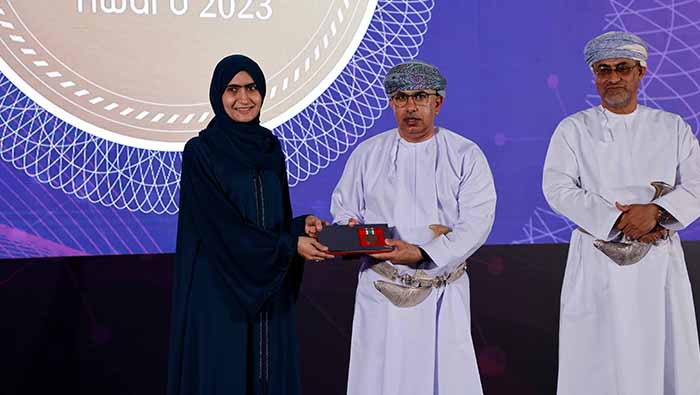
Muscat: The Winning in the Education and Human Resources sector in Young Researcher’s category, ‘The role of cultural intelligence and adaptation methods for the level of problems faced by Omani scholarship students’ by principal investigator Marwa Nasser Al Rajhi from Sultan Qaboos University (SQU) is among the winning innovative research projects in the 10th National Research Award, organised by the Ministry of Higher Education, Research and Innovation.
In her research project, Marwa Al Rajhi aimed to identify the level of problems suffered by Omani students sent to study abroad, as it focused on three areas of problems: academic and cultural problems, psychological problems, and economic problems.
The study revealed the importance of the role of cultural intelligence, and how it can help students overcome these problems directly and indirectly through the presence of adaptation methods (positive and negative) as mediating variables in the relationship between cultural intelligence and the level of problems.
The study sample consisted of 3,331 male and female students studying in various universities outside the Sultanate of Oman.
The largest percentage of the sample were students studying in the United Kingdom and the United States of America. The educational stages of these students varied between undergraduate students and postgraduate students. It also included the various academic years, starting from the first year until the seventh year.
In the study, researcher Marwa Al Rajhi found that there is a series of direct and indirect relationships between cultural intelligence, adaptation methods, and the level of problems of all kinds.
For example: a high level of cultural intelligence leads directly to a lower level of academic, cultural, and psychological problems, and it also affects indirectly through its effects on positive adaptation.
The high level of cultural intelligence among students leads to an increase in the level of positive coping methods that students resort to, which in turn leads to a decrease in the level of psychological problems. Also, the high level of negative coping methods leads to an increase in the level of all types problems that students suffer from.
The study also revealed a clear role for the interaction between student gender and academic year in the level of economic problems that students suffer from, as females in general face a higher level of economic problems compared to males.
Moreover, the level of economic problems among males increases significantly from the first year until the second year, but begins to gradually decrease until the fourth year. As for females, the level of economic problems is almost constant, with a very slight increase and decrease between the four years.
Likewise, no effect of this interaction appeared on academic, cultural, or psychological problems, but it revealed that females in general have a higher level of these problems compared to males, and it also turned out that students in the first year of school suffer from a higher level of academic and cultural problems compared to older students.
Marwa Al Rajhi recommended the importance of organising training programmes for scholarship students before they leave for the scholarship country by the competent authorities in the Ministry of Higher Education, Research and Innovation to prepare students to study in the scholarship country, as well as organising an integrated induction program for students after their arrival in the scholarship country by the cultural attachés, which contributes to preparing students psychologically, culturally, and academically and building a bridge of communication with officials in that country.
The study focused on the necessity of educating students before they leave for the scholarship country about the amount of financial support provided to them, and the importance of good planning and spending to manage their expenses and avoid economic problems, with a focus on females and students in general in the first years of study, because the study showed an increase in economic problems among these two groups.
The study also proposed creating an electronic platform or virtual association for Omani students on scholarship in all countries, so that it brings together these students and gives them the opportunity to discuss, inquire, and provide psychological support to each other, provided that it is under the supervision of specialists at the Ministry of Higher Education, Research and Innovation.